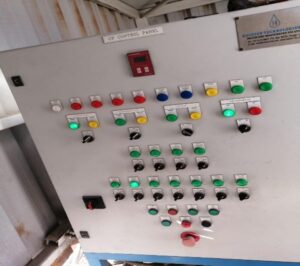The grey water system at Campus is a sustainable initiative that supports water sensitive waste disposal. The system has a capacity of 16 cubic meters per day, which is significant considering the amount of water that can be saved through its implementation. The grey water system collects wastewater from the wash basins of the toilets and filters it for reuse in two ways: for flush tanks of the toilets and for irrigation purposes. This reduces the amount of fresh water that is required for these activities, thereby conserving water resources and promoting sustainable water management practices. The use of grey water for flushing toilets is particularly effective because it does not require high-quality water. Grey water is not suitable for drinking or cooking, but it is still safe for other uses such as flushing toilets and irrigating plants. By using grey water for these purposes, the demand for fresh water is reduced, and the amount of wastewater that needs to be treated is also minimized. In addition to conserving water resources, the grey water system also helps to reduce the environmental impact of wastewater. Wastewater can contain pollutants such as chemicals, microorganisms, and other harmful substances that can contaminate water sources and negatively impact human health and the environment. By filtering and reusing grey water, the amount of wastewater that needs to be treated and discharged into the environment is reduced, thereby reducing the risk of pollution




